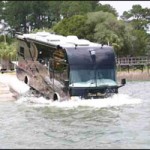Many people with special needs find that they can travel in comfort and convenience in an RV. More than a dozen manufacturers offer RVs and conversion vans with features such as wheelchair lifts or ramps, roll-under sinks, and lower kitchen counters and cabinets.
Additional information on services for travelers with disabilities is available at the following locations:
- RV.net forum: RVing with Disabilities and General Health Issues
- Travelin’ Talk Network
- Woodalls
- Search the Web using “handicapped accessible RV.”
- Visit www.rv-info.net. Click on the Specialty Vehicles link at the bottom of the home page.
- Visit www.access-able.com, a Web site dedicated to mature and disabled travelers. Click to the Links page, then click on Transportation for further leads on whom to contact to rent accessible vans and motorhomes.
If you or a family member has special needs, talk with an RV dealer about your specific circumstance. The dealer can work with you and the RV manufacturer to customize the RV, or the dealer may have a used handicapped-accessible RV on hand that will work for you.
Campgrounds have adapted to meet the needs of physically challenged travelers. Many offer wide, level, paved sites for easy use by people with wheelchairs, walkers or electric scooters. Some offer recreation programs and food services designed to meet the physical and nutritional requirements of their customers with special needs. To check a campground’s accessibility, contact the campground directly.
For information on accessibility in our national parks, go to www.nps.gov. Type “accessibility” in the Search box, then click Search.
People with special needs can volunteer at Passport in Time, an archaeology and historic preservation program of the USDA Forest Service. The activity and location of the project determines the degree of accessibility.
Passport in Time
505-896-0734 or 800-281-9176 (voice, TTY)
[email protected]
www.passportintime.com (Scroll down the page to “PIT and People with Disabilities.”)
For those of you with special needs who are already RVing, what bits of advice can you give to those newly disabled or those with special needs who are looking into the RV lifestyle? Please weigh in with your comments!
Enjoy your RVing!
Bernice


Pingback: Fisher's wealth management
Pingback: my homepage
martin shenkman
Accessibility is a tremendously important topic, but “disabilities” is far broader than merely the issue of physical accessibility.
120 million Americans live with some type of chronic illness. 26% of Americans age 65-74 live with chronic illness that significantly affects their life.
Many common chronic and other illnesses create a range of symptoms and issues that are often difficult for those unaware to identify, but they are no less disabling than other more visible symptoms. These may include cognitive issues, fatigue (not tired the way most people experience it but a fatigue that is often itself disabling) and so on. Too often society in general doesn’t respond with sufficient sensitivity or compassion to those with a known or obvious physical disability. But for those with “invisible” disabilities the insensitivity can be considerably worse. There are many sad stories of someone struggling with the symptoms of Parkinson’s disease or ALS being mistaken by passersby as their being intoxicated.
The difficulties of traveling with a severe chronic illness (medications that may have to be refrigerated), chronic disabling fatigue, special dietary restrictions, and so on can make RV travel not only the preferred method of travel, but the only comfortable or reasonable method. The RV itself, perhaps with no modifications depending on the health issues, can become a safe haven for many.
Judy
Sue, I understand your problems because I have not been able to network with others either. I am recently paralized but my husband and I are working on our goal to travel the US. We just ordered a new 40′ A from Rexhall Industries. Although it is pricey, they worked with us to custom design and added the lift also. Floorplans are on the website at http://www.rexhall.com
We are looking for campgrounds to accomodate us in southern Fl for the winter.
Gerry
Many RVers who can walk or stand can use the “seat”-type lift to enter/exit their Class A or trailer, but full-time chair or scooter users will need a complete platform lift added. There are very few manufacturers left who will modify an RV BEFORE you buy it; in most cases, you have to purchase the rig and then take it to a disability equipment modifier to have a lift or other specialized equipment added.
Winnebago does have a few floorplans available with lifts, but you have to fit their floorplan — which doesn’t work for everyone’s disability.
One of the few we’ve found that will completely design a floorplan from “scratch” is Born Free Class C’s. That’s who’s building us a unit to accommodate my wife and her Amigo scooter.
Don’t give up hope; there are ways of achieving the goal — to enjoy our great lifestyle as RVers.
Karen
My husband and I have been fulltimers since 1993. Shortly after we started fulltiming , I was injured and paralyzed from the waist down. We have met very few people in wheelchairs who even attempt RVing let alone fulltiming but it’s an excellent way to see the country and also to visit family and friends. The necessary equipment to stay healthy and functional is always with you – special bedding to prevent sores , an accessible bathroom and shower and storage for anything else you may need. If fact one of the nicest things is that with your own private bathroom , you never have to use a public restroom and risk getting an infection. Our RV is small and we don’t have use a toad so it’s always available for me to use.
But there are very few manufacturers who will actually do any upgrades to make their RVs accessible and with all the companies closing there are now even fewer. Winnebago is probably the best place to start. They seem to have put some effort and thought into the idea. Buying used would make more sense for most people. I found this site for used accessible RVs –
http://www.rvproperty.com/rvs_for_handicapped.htm
Campgrounds are a major problem. We don’t stay at many commercial parks and find that the access at public parks varies immensely. Since I don’t use public restrooms or showers that isn’t a concern but many times the sites are too sloped , too small to wheel around in and tables and grills are not accessible. The ADA rules are followed very loosely , if at all. Corp of Engineer parks , especially in the deep south are the best – large paved pads with accessible tables and sometimes even the lantern posts have lower hooks.
National parks are often unbelievably inaccessible – narrow sites , no curb cuts at overlooks and steps into buildings but because they were built to allow good access to a large part of the general public they are also accidentally very accessible. Views can be seen from the parking spaces and there are often paved trails and boardwalks. National parks will always be one of our favorite destinations.
This is a huge topic and I could go on for a long time. 😉 but instead if anyone wants more advice or has questions please feel free to PM me on the forums at – tonyandkaren
ddrsi
Sue , it would be a pleasure yo meet you. We live on the East coast of New Jersey
and have a few friends who would love to share the expience. They have the same problem or something similiar. Please contact myself and I woul gladly introduce your group and share my time with my friends and yourself and company at any a the great campsites in our area
Sincerely David.
Bob Schuetz
Enjoyed your article on H/C RVing, however, there is another side of this lifestyle, that of being visually ( blind ) and blind needs. Granted, while your article and links for the physically handicapped adresses the physical restriction, more is needed for the blind RVers.
My wife, Sue, lost her vision about 10 years ago (macular degeneration) but enjoys people and RVing. The trouble is, we have searched extensively for others with like handicaps and cannot find any groups, organizations, web sites etc. that we can contact. We would like to converse, meet ,and in general, create a friendship in order for Sue to share her world . She doesn’t have ” physical” restrictions, she simply cannot see.
Do you know of any groups, organizations, or even individuals with like conditions that we could contact? I’m going to research the links that you offered in your article, but I’m looking for any information I can get. for blind contacts.
We live in Kingman, Az. and have a 38′ MH and enjoy traveling.
Thanks for any info. you might have.A response would be most appreciated.